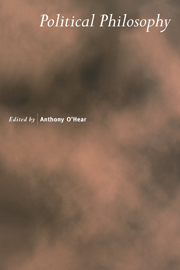Book contents
- Frontmatter
- Contents
- Preface
- Notes on Contributors
- Making the World Safe for Utilitarianism
- Innocent Before God: Politics, Morality and the Case of Billy Budd
- Democracy and Openness
- Rights and Human Rights
- Prerogative to Depart from Equality
- Casting the First Stone: Who Can, and Who Can't, Condemn the Terrorists?
- Against Egalitarianism
- Big Decision: Opting, Converting, Drifing
- The Epistemology of Unjust War
- High Culture, Low Politics
- Edmund Burke and the Anglo-American Tradition of Liberty
- The Politics of Emotion: Liberalism and Cognitivism
- Index of Names
Against Egalitarianism
Published online by Cambridge University Press: 04 August 2010
- Frontmatter
- Contents
- Preface
- Notes on Contributors
- Making the World Safe for Utilitarianism
- Innocent Before God: Politics, Morality and the Case of Billy Budd
- Democracy and Openness
- Rights and Human Rights
- Prerogative to Depart from Equality
- Casting the First Stone: Who Can, and Who Can't, Condemn the Terrorists?
- Against Egalitarianism
- Big Decision: Opting, Converting, Drifing
- The Epistemology of Unjust War
- High Culture, Low Politics
- Edmund Burke and the Anglo-American Tradition of Liberty
- The Politics of Emotion: Liberalism and Cognitivism
- Index of Names
Summary
Initial Doubts
It is possible that the fame of the Texas Rose Rustlers Society has not yet reached readers of these words. They may want to know then that its members prize roses that survive unattended in the wilds of Texas, having eluded the benevolent attention of gardeners. These unattended roses are not too distantly related to the ‘unofficial English rose’ that the poet says ‘Unkempt about those hedges blows’ in the proximity of The Old Vicarage at Grantchester. As all respectable societies, the Texas Rose Rustlers has by-laws stating the principles that unite its members. Here are some of them: there is more than one way of being beautiful; good climates are in the eye of the beholder; if you are attacked by disease, abandonment, or a bad chain of events, do not despair, there is always the chance that you were bred to be tough; and everyone should not smell the same. I mention these admirable principles because they offend profoundly against egalitarianism, which happens to be my target on this occasion.
Egalitarianism threatens to become the dominant political ideology of our age. Since it is unreasonable, morally unacceptable, and politically dangerous, its dominance, in my opinion, would not be a good thing. A simple statement of egalitarianism is that all human beings, and no doubt roses too, should be treated with equal concern unless there are good reasons against it.
- Type
- Chapter
- Information
- Political Philosophy , pp. 137 - 156Publisher: Cambridge University PressPrint publication year: 2007



